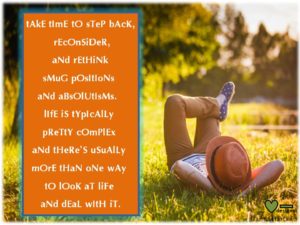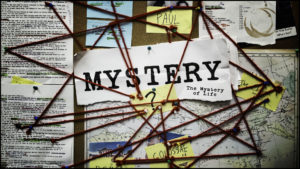Oh No! I’m Having a Major Crisis!

Have you ever had a big dilemma? I mean a big dilemma—a major-crisis type of dilemma that seems completely impossible and unsolvable? A concern so big that you are sure it just might sink you? I have. I have had moments of extreme uncertainty, moments when the unknowns far outweigh any reasonable outcome. In fact, wouldn’t it be funny to know that is the very reason I’m even composing an article on dilemmas? Now, don’t lose faith in me while I admit that because I see this moment with beauty, actually. I see hope in this dilemma even as I’m freaking out about the impossibly of favorable resolution.
Why? I don’t know. That’s it: “I don’t know.” I may be weird but I like this phrase. (Actually, to be perfectly honest, it’s a love/hate relationship.) To some, this state of ignorance can be a turn off. However, as maddening as the situation is, I find so often that the state of “I don’t know” is the onset of discovery and personal power. Because of my belief in the state of “I don’t know,” I rarely like receiving advice and I rarely give advice. I’d much rather ask questions and allow uncertainty, self-reflection, and personal discovery. I’d much rather accept the darkness, believing inner light is just around the corner. I’d much rather believe that people are smart and will figure it out with enough patience and true belief in the struggling process.
 Now, that does not in any way mean that I am in favor of abandoning strugglers in the state of “I don’t know.” No, that can be very damaging. But there is a better way to help people through this process than telling them how they should be feeling or how they should think about the situation or how they should solve the problem. Advice, at times, can be so harmful to strugglers. It can cause them to sink into feelings of despair, resentment, and even anger. So the irony of this article is that I am going to give some advice about what NOT to do when a person is in the state of “I don’t know.” But I’m going to state it in the opposite forms of what IS helpful instead of what is not.
Now, that does not in any way mean that I am in favor of abandoning strugglers in the state of “I don’t know.” No, that can be very damaging. But there is a better way to help people through this process than telling them how they should be feeling or how they should think about the situation or how they should solve the problem. Advice, at times, can be so harmful to strugglers. It can cause them to sink into feelings of despair, resentment, and even anger. So the irony of this article is that I am going to give some advice about what NOT to do when a person is in the state of “I don’t know.” But I’m going to state it in the opposite forms of what IS helpful instead of what is not.
Believe People Are Smart
It’s my belief and observation that change takes place much faster when people discover truth and answers on their own. When they see that the answers are within—that they were there all along just waiting to unravel and present themselves—this is true empowerment. When we believe that people are smart and will figure it out, we can restore self-confidence that can so easily be lost in the “I don’t know” process. If we fill them full of “shoulds,” “oughts,” “musts,” and “I’m above you’s” the result is often feelings of shame, anger, and guilt. It’s so much better to allow the moment of uncertainty to exist without causing the person to feel like it reflects shoddy worth or inferior intelligence.
We need to understand that when we are in the state of “I don’t know”, we are often reflecting one of these five underlying core concerns: affiliation, autonomy, appreciation, status, or role (Fisher & Shapiro, 2005). When facing these concerns, we find ourselves thrown out of our “know” zones. Our basic needs do not feel met, and consequently, negative emotions often arise. But with patience and love, we can figure out how to get to where we need to be.
Believe There Is Purpose in Struggle
 Life is a mystery. It is full of unknowns and problems to be solved! There is much beauty in embracing the struggles of life, but there is even more beauty to be found as we embrace the strugglers of life. When people are embraced rather than ignored, unacknowledged, corrected, or shunned during times of “I don’t know,” movement toward growth is more likely.
Life is a mystery. It is full of unknowns and problems to be solved! There is much beauty in embracing the struggles of life, but there is even more beauty to be found as we embrace the strugglers of life. When people are embraced rather than ignored, unacknowledged, corrected, or shunned during times of “I don’t know,” movement toward growth is more likely.
As humans, we are sometimes impatient with the space of not knowing, with times of darkness, with imperfect vision—both in ourselves and others. But by acknowledging these moments rather than ignoring, we help strugglers embrace emotions that are often deemed as negative. When emotions are ignored, cognitive impairment can create an undesirable and unproductive feedback loop in which people mentally rehearse negative emotions over and over, developing internal scripts leading them to perceive motives as entirely hostile (Frenkel & Stark, 2012). Thus, attending to emotions that emerge in life’s dilemmas is critical.
Believe in the Emptying Process
 One of the reasons I believe in allowing and embracing the state of “I don’t know” is because I know there is a very helpful avenue available to every struggler. I believe true empowerment—true personal knowledge—often begins through the emptying process, or venting. In fact, some researchers contend that venting allows strugglers to convey key concerns, clearing the mind, and acting as a catalyst for the healing process (Moore, 2014). Venting has also been shown to have a cathartic effect so that mental abilities and energies can be restored as inner conflicts are resolved (Williams et al, 2018). I believe that when people are allowed to be who they are and where they are at any given moment, power from within begins to emerge from the soul. I believe this because I have seen it again and again.
One of the reasons I believe in allowing and embracing the state of “I don’t know” is because I know there is a very helpful avenue available to every struggler. I believe true empowerment—true personal knowledge—often begins through the emptying process, or venting. In fact, some researchers contend that venting allows strugglers to convey key concerns, clearing the mind, and acting as a catalyst for the healing process (Moore, 2014). Venting has also been shown to have a cathartic effect so that mental abilities and energies can be restored as inner conflicts are resolved (Williams et al, 2018). I believe that when people are allowed to be who they are and where they are at any given moment, power from within begins to emerge from the soul. I believe this because I have seen it again and again.
Let’s consider four important points the listener in this process can choose to adopt:
- Allow others to let it all out. I once had a very wise bishop. This man knew how to make people feel safe, valued, and loved. I saw him work his magic over and over. Once he told me of a woman we both knew and loved who had intense trials. He said she would come into his office and “let it all out.” She expressed unrestrained anger and hurt with vengeance. As she spoke, she was filled with desperate “I don’t know” sentiments. He had no alarm while she spoke because he had absolute confidence in her. He offered her no advice and would just listen quietly to her. Then after the anger, uncertainty, and tears of bitterness flowed, the tears of humility followed. Again, he would only coax and encourage and love her. Finally, she would see what she needed to do. She was filled with love and understanding and vision. She had hope. As her soul emptied, a holding place was created, allowing it to be filled with insights and new direction.
 Have pure motives. In truth, as we try to help people, we cannot be focused on or motivated by results. Our motivation must be pure love for the very reason that we and others know if someone really cares or if there is trickery involved. Further, if we have ulterior motives, we will tire out because more often than not, when hearts are so full of junk, the emptying out process can be exhausting for the listener. All of the irrational fears and confusions often come out first. (Perhaps especially for women!) If the listener is careful, he will not jump in with repair equipment and stitch up the heart before it barely starts the opening process. How often this happens! When a person opens up, she is making an important effort to let go. The listener often makes the mistake of feeling the need to take serious corrective actions, to run to the rescue, or to judge, condemn, and even withdraw. When this happens, the person seeking to open the heart decides on her own that she will just close it off herself—Don’t do operations on me; can’t you see your own need for repair? she admonishes. She resents the patronizing or well-intended rescue attempt. She concludes a closed heart is safer since no one will accept her unpleasantries; therefore, she will just keep them tucked tightly in her heart. Consequently, she closes her heart and does not allow the emptying process to fully occur.
Have pure motives. In truth, as we try to help people, we cannot be focused on or motivated by results. Our motivation must be pure love for the very reason that we and others know if someone really cares or if there is trickery involved. Further, if we have ulterior motives, we will tire out because more often than not, when hearts are so full of junk, the emptying out process can be exhausting for the listener. All of the irrational fears and confusions often come out first. (Perhaps especially for women!) If the listener is careful, he will not jump in with repair equipment and stitch up the heart before it barely starts the opening process. How often this happens! When a person opens up, she is making an important effort to let go. The listener often makes the mistake of feeling the need to take serious corrective actions, to run to the rescue, or to judge, condemn, and even withdraw. When this happens, the person seeking to open the heart decides on her own that she will just close it off herself—Don’t do operations on me; can’t you see your own need for repair? she admonishes. She resents the patronizing or well-intended rescue attempt. She concludes a closed heart is safer since no one will accept her unpleasantries; therefore, she will just keep them tucked tightly in her heart. Consequently, she closes her heart and does not allow the emptying process to fully occur.- Believe your presence can help. The emptying process can be hard for both the listener and the venter. Keep in mind that this can be especially true for the venter. Allowing another into our “I don’t know” space can be risky. I was talking to a male friend once who said it was he who closes off the draining process. He said when he starts “letting it all out,” he realizes how crazy he sounds so he quickly self-corrects. He does not want to feel humiliated or vulnerable or to let anyone really know how “messed up” or “unglued” he really is. It can be so hard to accept our state of “I don’t know,” to surrender our confusion, our imperfections, although we know it so perfectly well inside that we are anything but tightly put together, thus, we don’t want outsiders to know this as well! But as a listener, we can help this process with our patience, complete acceptance, and validating affirmations.
 Be an active and sincere listener. If we are on the listening end, we are wise to quietly, encouragingly listen to the aching heart. We are wise to realize that the ache must come out; the heart must be drained and emptied in order for wisdom and love to have room enough to enter. The listener who is wise and patient will find him/herself involved in a most beautiful healing process for not only the one seeking their way out of “I don’t know” but also for the listener as well. The wise bishop I mentioned had this ability to sit, listen, and allow the draining process to run its course without interruption, without prejudice, without alarm. It was the mark of his greatness. He believed in people. He didn’t try to correct or fix them. He didn’t look down on them. He just loved them. He believed that within each soul answers were held, that the solutions would present themselves as he allowed the vessel to be emptied.
Be an active and sincere listener. If we are on the listening end, we are wise to quietly, encouragingly listen to the aching heart. We are wise to realize that the ache must come out; the heart must be drained and emptied in order for wisdom and love to have room enough to enter. The listener who is wise and patient will find him/herself involved in a most beautiful healing process for not only the one seeking their way out of “I don’t know” but also for the listener as well. The wise bishop I mentioned had this ability to sit, listen, and allow the draining process to run its course without interruption, without prejudice, without alarm. It was the mark of his greatness. He believed in people. He didn’t try to correct or fix them. He didn’t look down on them. He just loved them. He believed that within each soul answers were held, that the solutions would present themselves as he allowed the vessel to be emptied.
In Conclusion
Without question, times of “I don’t know” can be scary. It is scary to acknowledge and release our doubts and fears and we have to be careful when confiding in another. Not everyone is going to hold our hearts safe. We are wise to use discernment on whom or when we open up. However, if we are wise, we will allow the opening process to occur with trusted confidantes who can be of great help into moving us into states of greater clarity and vision.

And when we are on the listening end, may we remember these words by Stephen R. Covey: “It is much more ennobling to the human spirit to let people judge themselves than to judge them. And in a high trust culture, it’s much more accurate. In many cases people know in their hearts how things are going much better than the records show. Discernment is often far more accurate than either observation or measurement” (The 7 Habits of Highly Effective People, 224).
So the next time we find someone who is having a major crisis, who is in the state of “I don’t know,” perhaps we can remember these three ideas: 1-Believe people are smart and will figure it out; 2-believe there is purpose in their struggle; and 3-believe we can be of help in the healing process by listening to them with complete acceptance, fully believing in their ability to emerge stronger and more visionary than ever.
 **Danna is the creator of The Mormon Trauma Mama. She is actively involved in advocating for those suffering from church trauma and is currently getting her Master’s degree in Pastoral Counseling from California Southern University. She and her husband have four delightful children. For more information on church trauma, watch this presentation.
**Danna is the creator of The Mormon Trauma Mama. She is actively involved in advocating for those suffering from church trauma and is currently getting her Master’s degree in Pastoral Counseling from California Southern University. She and her husband have four delightful children. For more information on church trauma, watch this presentation.



